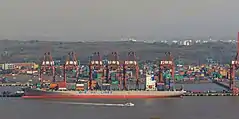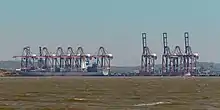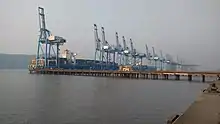Jawaharlal Nehru Port
Jawaharlal Nehru Port, also known as JNPT and Nhava Sheva Port, is the second largest container port in India after Mundra Port.[4][5] Operated by the Jawaharlal Nehru Port Trust Authority (JNPTA), it is located on the eastern shores of Arabian Sea in Navi Mumbai, Raigad district, Maharashtra. This port can be accessed via Thane Creek, a nodal city of Navi Mumbai.[6] It is the main port of the Mumbai Metropolitan Region after Mumbai Port, also of Maharashtra and Western India. Its common name derives from the names of Nhava and Sheva villages that are situated here. It is also the terminal of the Western Dedicated Freight Corridor.
| Jawaharlal Nehru Port जवाहरलाल नेहरू बंदर | |
|---|---|
.jpg.webp) The port along with Belpada Canal on the top left and an HMM container ship docked at bottom | |
| Location | |
| Country | |
| Location | Navi Mumbai, Raigad district, Maharashtra |
| Coordinates | 18°57′N 72°57′E[1] |
| Details | |
| Opened | 26 May 1989 |
| Operated by | Jawaharlal Nehru Port Trust Authority (JNPTA) |
| Owned by | Government of India |
| No. of berths | 3 |
| Terminals | 4 |
| Statistics | |
| Annual cargo tonnage | Bulk: 7.01 million tonnes (2022-23)[2] Container: 75.94 million tonnes (2022-23)[2] |
| Annual container volume | 5.50 million TEU (2022-23)[3][2] |
| Website jnport | |
As of January 2023, the port is undergoing upgrades with the help of a loan agreement signed between the Asian Development Bank (ADB) and Nhava Sheva Freeport Terminal Private Limited (NSFTPL). The loan of $131 million will be used to improve the terminal's infrastructure, increase its container handling capacity, upgrade existing berths and yards, and install energy-efficient equipment. The upgrades aim to attract vessels and make international trade more efficient, transparent and sustainable.[7]
History
The port was established on 26 May 1989.
JN Port is the second largest container handling port in India after Mundra Port,[8][9] crossing 4 million TEUs (Twenty-foot equivalent units) in containers throughout consecutively between 2016 and 2021.
JNP consists of a full-fledged Customs House, 30 Container Freight Stations and connectivity to 52 Inland Container Depots across the country. The hinterland connectivity both by rail and road is being further strengthened by ongoing projects like the Dedicated Freight Corridor (DFC), which will increase the existing train capacity from 27 to 100 trains per day; Multi-Modal Logistics Park (MMLP) and widening of the Port's road connectivity. It is in proximity to the Cities of Mumbai, Navi Mumbai and Pune; airports; hotels, exhibition centres, etc. gives the Port an extra edge to address the shippers’ needs, efficiently and promptly.
Facilities
The JNP Trust (JNPT) Container Terminal is operated by JNPT. It has a quay length of 680 metres (2,230 ft) with 3 berths.[10]

The Nhava Sheva International Container Terminal (NSICT) is leased to a consortium led by P & O, now a part of DP World. Commissioned in July 2000, it has a 600 metres (2,000 ft) quay length with two berths. It can handle up to 62.15 million tons of cargo.[11] NSICT was India’s first privately managed container terminal. In the year 2006, GTI (Gateway Terminals India Pvt Ltd), a third container terminal operated by APM Terminals, with the capacity to handle 1.3 Million TEUs was commissioned. A new standalone container terminal by the name of NSIGT having a quay length of 330 m and a capacity of 12.5 Million Tonnes will be fully operational by July 2016. The fourth container terminal, Bharat Mumbai Container Terminals (PSA Mumbai), is developed and operated by PSA International. The Phase 1 with capacity of 2.4 Million TEUs p.a. had completed in Dec 2017. The terminal will have full capacity of 4.8 Million TEUs p.a. and a quay length of 2,000 m by the completion of Phase 2.

In 2006, the port implemented the logistics data tagging of containers.[12] JNPT houses India’s best logistics connectivity with facilitation from Container Freight Stations and Logistics parks owned by government as well as private players namely Maharashtra State Warehousing Corporation, DRT, Gateway District Park, Allcargo, Avashya, Continental Warehousing, Ameya Logistics, TransIndia and Contegrate Entrepot. JNPT authorities have been trying to implement direct port delivery model of the containers, a first of its kind model promoted under the ease of doing business in India.
Traffic

Major exports from Jawaharlal Nehru Port are textiles, sporting goods, carpets, textile machinery, boneless meat, chemicals, and pharmaceuticals. The main imports are chemicals, machinery, plastics, electrical machinery, vegetable oils, and aluminium and other non-ferrous metals. The port handles cargo traffic mostly originating from or destined for Maharashtra, Madhya Pradesh, Gujarat, Karnataka, as well as most of North India.
See also
References
- "Geographic Location". Jawaharlal Nehru Port Trust. Archived from the original on 17 October 2011. Retrieved 23 September 2011.
- "JNPA - Traffic Dept. Performance Report for the month of Feb-2023 & FY 2022-23". Jawaharlal Nehru Port Trust. Retrieved 23 March 2023.
- "JNPT crosses 5 mn TEUs of container handling in 2018". The Hindu. Retrieved 9 January 2019.
- Bureau&, Our. "Mundra pips JNPT to become India's biggest container port". www.thehindubusinessline.com. Retrieved 21 June 2022.
- "Top 10: Mundra busiest container port in India & Australia". supplychaindigital.com. 15 February 2022. Retrieved 21 June 2022.
- "Air India's Mumbai building to be sold to JNPT: Nitin Gadkari". Times of India. 3 July 2018. Retrieved 3 July 2018.
- "recent development".
- Bureau&, Our. "Mundra pips JNPT to become India's biggest container port". www.thehindubusinessline.com. Retrieved 16 May 2022.
- "Top 10: Mundra busiest container port in India & Australia". supplychaindigital.com. 15 February 2022. Retrieved 16 May 2022.
- "JNPT Container Terminal". Jawaharlal Nehru Port Trust. Archived from the original on 17 October 2011. Retrieved 23 September 2011.
- "NSICT Private Terminal". Jawaharlal Nehru Port Trust. Archived from the original on 17 October 2011. Retrieved 23 September 2011.
- Arora, Rajat. "JNPT becomes first port in logistics data tagging of containers". The Economics Times. Retrieved 11 May 2018.